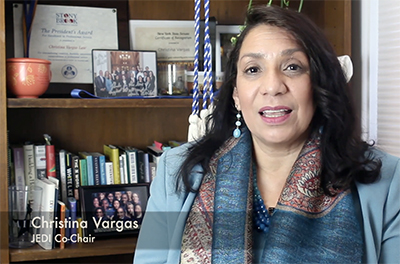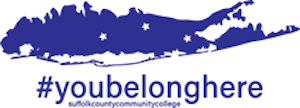Cynthia Eaton
The "ouch" rule. Calling on math students to share their struggles rather than their answers. Mandatory office hours. Showing students all the ways that they belong here. Avoiding "double jeopardy" in history classes. Think-pair-share. Calling out Americentric perspectives in economics class. My head was swimming with terrific concepts after the January 7 JEDI Institute session. The pilot for the JEDI program kicked off last July, with three summer sessions that brought together dozens of colleagues to discuss how we can make SCCC more just, equitable, diverse and inclusive. We read and discussed From Equity Talk to Equity Walk, we shared a range of SCCC specific resources and external resources, we started sharing JEDI strategies with one another and we developed plans to implement for fall 2021.
Joe Bernat, adjunct math instructor, remembers being in numerous math classes as a student where the professors would do one problem on the board and give a similar problem to the class, then call on the first students who raised their hands for the correct answer. Joe obviously learned in those classes, but he became a math professor and most students do not. He realized from annual NYSMATYC conferences that there are more engaging ways to teach math. "Calling on the first students with their hands raised rewards speed rather than carefulness and perseverance," Joe explains. "I emphasize that math is about process as much as product, so rather than ask for correct answers, I ask students to either share one question or one struggle they had as they worked through the problem. This shows the class that we all have questions and struggles and that's okay." Joe describes some of his other JEDI strategies especially for addressing math anxiety, such as giving students the correct answers and asking them to explain, in his JEDI Institute: Colleagues Share page and video. How many times we have heard colleagues complain that students don't come to our office hours for extra help, even when you've encouraged students to come over and over again? Andrew Stone in the cybersecurity department not only teaches students what office hours are for, since we know not all students realize this, but also mandates 15-minute office hour visits for each student. Done early in the semester, he notes, this makes a big difference. "Cybersecurity is a small, tightly defined, applied degree curriculum. Students need to proceed in a particular order to get through the major, and I can have these students in seven or eight different classes." Even a brief office hour visit enables Andrew to get to know each student better and shows students how approachable and available he is.
Helping undocumented students understand that they truly belong at SCCC is a major initiative of the Undocumented Student Task Force. Having developed a diversity statement that now graces syllabi across the college, several JEDI participants from last summer continue to work on the #youbelonghere initiative. Joan Cook (library) reported on behalf of the group that the campaign was promoted during fall 2021 Campus Activities Days across all campuses. Tee shirts bearing the #youbelonghere logo were sold to the campus community, and stickers and window clings were purchased and given out to students. A #youbelonghere video featuring SCCC students sharing their experiences of belonging at SCCC was created by radio and TV students. A second video featuring faculty and administrators is currently being produced. Describing a transformative realization early in his teaching career, Justin Turner (history) explained the impetus for some shifts in his pedagogy and policies. "My college experience was at a four-year liberal arts college populated by traditional age students. So early on, I thought my job was to teach community college students the same way I was taught, to expect the same results despite our starting from very different places. I now view the job as a bridge to the four-year, on-campus experience rather than an attempt to replicate it." Justin described the process by which he came to realize that deducting points for absences was a kind of double jeopardy for students since so much of his exam material comes from classroom conversations. His attendance policy is now incentive based rather than punitive. He also now drops the lowest grade to reward persistence and help avoid course dropouts and he has revised his approach to academic misconduct in a more JEDI fashion as well. Think-pair-share is a teaching technique first proposed in the early 1980s, but we still meet faculty who are unfamiliar with its use and how it can be employed to make our classrooms feel more inclusive and productive. Melissa Adeyeye explained why it's effective in her classes. "This is especially useful in communication classes because think gives them a moment to reflect, pair enables them to get to know their classmates better and share engages us as a class. It also helps with students who are shy, anxious or uncertain because they can simply read what they had written during the two-minute think reflection. Another benefit is it helps build classroom community so any hot moments that arise are more manageable." Some other JEDI strategies came from Tom Flesher in economics. Tom described how he conducts questionnaires on student interests early in the semester so he can tailor his examples of various economic principles to student interests. For example, he often gets a number of automotive technology program students, so he'll use cars as examples since it draws in those students but also everyone is familiar with cars. Tom also offers flexibility on due dates and has created a series of short step-by-step videos in which he demonstrates how to work through different economic problems. "These videos help students who are too shy or embarrassed to let me know they need extra help, plus it helps students if they miss a class." Perspective taking could also serve as the perfect theme for that January JEDI meeting. I know that every time I start thinking I'm a pretty decent teacher, I listen to colleagues like the ones above and realize that there are many more ways to engage students and better ensure the success of all who come into our classrooms. Interviewing this year's FA member excellence award recipients just blew me away too. The talent, skill and commitment to student success demonstrated by Andrew Stone, Misty Curreli, Liz Roddin, Kellie McCartin and Courtney Desmond is absolutely—as Dante notes in his cover story—one of our union's greatest strengths. Check out the resources on our JEDI Institute website, whether from colleagues or from external sources, and definitely get in touch if you have ideas to share. Keep an eye out for our spring schedule of JEDI activities too as well as for our official JEDI Institute launch this summer. |

